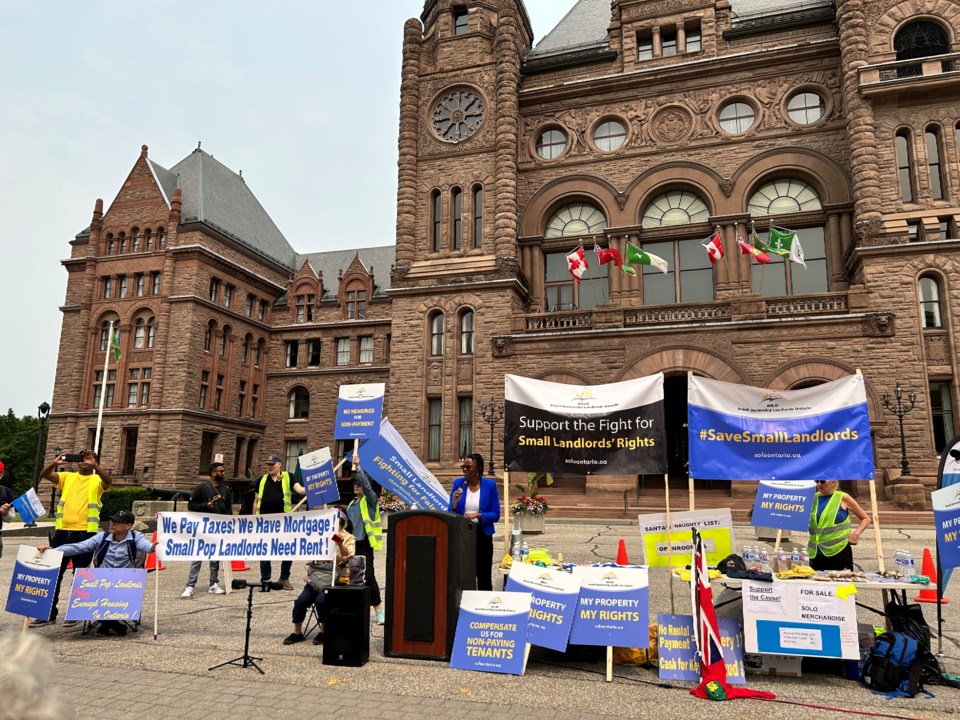EDITOR’S NOTE: This article originally appeared on The Trillium, a new Village Media website devoted exclusively to covering provincial politics at Queen’s Park
Tensions over the clogged-up virtual tribunal system boiled over into the physical realm Monday.
A lobby group representing small landlords protested outside Queen's Park, calling for easier evictions and harsher penalties for misbehaving tenants – demands that one tenant advocate said would backfire with even longer delays.
For about three hours, a bemegaphoned man led a few dozen people in scores of chants, including, "We pay taxes," "No hearings for nonpayment," "My property, my rights," "We want justice," "We deserve respect," "No more division," and, "Tenants and landlords work together" (which was too long and was abandoned quickly).
Landlords and tenants alike have complained about months- and years-long delays at the Landlord and Tenant Board (LTB). A recent ombudsman report detailed a bureaucratic nightmare causing unsafe living situations and mountains of debt.
Small Ownership Landlords Ontario (SOLO), which organized the protest, has registered to lobby the province. It's asking for the government to allow the LTB to adjudicate "straightforward" cases like nonpayment of rent or landlords needing their property for personal use, without actually hearing them.
SOLO would also like the legislation to make entering into a rental agreement using false pretenses an offence under the law.
The group says it's already had meetings with Premier Doug Ford, Attorney General Doug Downey and Housing Minister Steve Clark.
SOLO Vice-Chair Rose Marie said getting rid of hearings for nonpayment cases would "change behaviour" by showing tenants that they can't get away with "loopholes" like months-long eviction hearing delays.
"It's almost like, if you went to work, and you didn't get paid, nobody would think that that would be fair," she told The Trillium outside the legislative building.
She said it should be easier for landlords to garnish tenants' welfare payments.
"So if they're on social assistance ... I should be able to approach social services and say, here's the lease. I have someone that's staying in my unit. You are sending them money and part of that money is for covering the rent. So send me that money," she said. "But they're constantly roadblocking."
The LTB could also work as a third-party payment processor, Marie suggested. Tenants could pay rent to the LTB, which would then disperse that money to landlords.
"Things could be done. Be innovative," she said.
Clark's office didn't say whether it was considering SOLO's asks, instead touting the millions it's spent on the LTB.
Ontario has already experimented with no-hearing evictions and it didn't work, said Douglas Kwan, the director of advocacy and legal services at the Advocacy Centre for Tenants Ontario.
In the late '90s, the Harris government changed the law so if tenants didn't dispute an eviction notice within a few days, it became automatic, Kwan said. That was reversed under the McGuinty government in 2006.
Those years didn't see faster evictions, because while some tenants didn't dispute the orders, more filed appeals after the fact, Kwan said.
"And so we feel that any move toward a process that brings us back to those old days would have a similar outcome," he said.
People with language barriers might also take the eviction notice at face value, without realizing it's a notice of intent, not an order, Kwan said. That happens often today, he said.
As for the "false pretenses" ask, fraud is already a criminal offence, Kwan said.
To speed up the Landlord and Tenant Board, the government should bring back in-person hearings, which were axed during the pandemic, he said.
The shift to online-only has resulted in confused hearings with parties who often don't fully understand computers or have poor internet connections that frequently cut out.
"The associate chair (of the LTB) mentioned that it used to only take four days to issue hearings when it was in-person. Now it's 30 days," Kwan said.
NDP Leader Marit Stiles said she understands the frustrations of landlords and tenants.
"I would say that we need to actually just get through the hearings," she said. "We need to make sure we're getting through them faster. We need to make sure that everybody is getting quick access to justice. That's definitely the answer."



